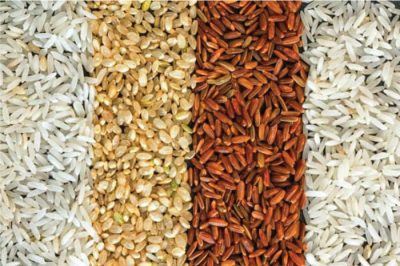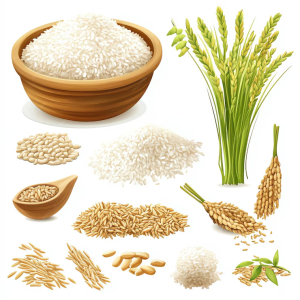Rice is one of the most important food items in the world. Half of the world’s population depends on rice as a staple food.
It is one of the oldest and most consumed cereals in the world, which is used as a staple food by millions of people around the world.
And due to the need for special weather conditions, it is mainly cultivated in tropical and subtropical regions.
Rice alone supplies 40% of the food needs of half of the world’s people. This food is from the wheat family.
The largest supplier and consumer
Countries like China, India and Indonesia are among the largest producers and consumers in the world.
The most important point
One of the most important things you should know about rice is that when rice comes out of its shell, its color is brown, but when it is poured into special machines and rubbed against each other, its outer shells , it separates from it and becomes transparent white.
Rices are not the same in terms of having nutrients and useful substances, and each of them can provide our body with useful substances based on their quality. One of the best types of rice that the whole world wants and who breaks their heads to use it is Iranian rice. Iranian rice, especially northern rice, has a unique aroma and taste, so every year a large amount of it is bought by foreign countries.
Rice is cultivated in tropical and subtropical regions and needs a lot of water for its growth. Due to its great genetic diversity, this plant is found in different types, each of which has its own unique features and characteristics.
This plant has a high nutritional value with carbohydrates, proteins, vitamins and minerals, and at the same time it has a special place in the culture and tradition of many countries.
This plant seed is used alone and in all kinds of soups, side dishes and main dishes in Asia, the Middle East and many other dishes. .
Each plant of this plant produces hundreds of seeds. The length of one seed is 6 to 10 mm.
Types 
- white
- brown
- Basmati , the main rice in preparing Indian and Pakistani dishes
- Jasmine , a type of Thai rice
- Japanese (sushi rice)
- Bomba , Spanish rice
- Arbario , Italian rice
- Chinese black
- wild rice
- Kalijira
A grain of rice consists of four parts:
- Hull: the hard shell and outside of the seed
- Bran: the layers that protect the inner parts of the grain.
- Endosperm: the lower part of the bran
- Bud: the innermost part from which a new rice plant grows
Production steps
- drying or paddy field
- sifting
- Separating stones or grinding
- Peeling
- Whitening
- Using a polisher
- Sieve
- warehouse
- The second sieve
- Sorting
- packaging
Some of the most popular types of rice are Tarem, Hashmi, Demsiyah and Anbarbo.
Foreign rices include: basmati, Japanese and jasmine.
Its nature
Some consider rice hot, some consider it cold, and some consider it moderate
rice reformer
Saffron, dill, black cumin and soaking in salt water
How to maintain
You can use the following methods for long-term storage and maintaining its quality
- Dry and cool place: Store rice in a dry and cool place. The best temperature for storage is about 4 degrees Celsius.
- Cloth bags: Store rice in cotton cloth bags to absorb moisture and prevent pests.
- Distance from the floor and the wall: Place rice bags at a distance from the floor and the wall to allow air to flow well and prevent moisture.
- Regular inspection: Check the rice regularly for insects and pests.
Properties 
- Maintain a healthy weight range
- Reduce inflammation
- Improve blood cholesterol levels
- Reducing the risk of cardiovascular diseases
- Blood pressure control
- Reducing the risk of cancer
- Treatment of digestive problems
- Help to treat mental disorders
- Immune system booster
- Skin health and youth
- Improving hair growth and preventing hair loss
- Prevention of male diseases such as prostate and…
- Help regulate female hormones and prevent ovarian laziness
- Enhancement of sex hormones
- Prevent Alzheimer’s
- Relief of symptoms of irritable bowel syndrome
- Support brain function
- Prevent muscle tissue damage
- Prevent osteoporosis
- Reduce the risk of kidney failure
- Strengthening the nervous system
Complications of high consumption
- cause lethargy
- weight gain
- causing abdominal bloating
- It affects the metabolism of glucose in the body
- It leaves no room for a balanced diet
- It prevents the absorption of several vitamins and minerals
- diabetes
- Arsenic toxicity
Nutritional value table
| The main constituent | Amount per 100 grams |
| energy (calories) | 130 kcal |
| Carbohydrate | 28.59 grams |
| Protein | 2.38 grams |
| fat | 0.21 grams |
| water | 68.61 grams |
| fiber | 0.00 grams |
| sugar | 0.00 grams |
| Cholesterol | 0.00 mg |
| Vitamins of ordinary cooked rice | |
| The name of the vitamin | Amount per 100 grams |
| Vitamin A | 0.00 µg |
| Vitamin D | 0.00 µg |
| Vitamin E | 0.00 mg |
| Vitamin K | 0.00 µg |
| Vitamin C | 0.00 mg |
| Thiamine (B1) | 0.02 mg |
| Riboflavin (B2) | 0.02 mg |
| Niacin (B3) | 0.40 mg |
| Choline (B4) | 0.00 mg |
| pantothenic acid (B5) | 0.41 mg |
| Vitamin B6 | 0.05 mg |
| Folate (B9) | 2.00 micrograms |
| Vitamin B12 | 0.00 mg |
| Minerals of ordinary cooked rice | |
| The name of the mineral | Amount per 100 grams |
| calcium | 3.00 mg |
| iron | 0.20 mg |
| magnesium | 13.00 mg |
| phosphorus | 37.00 mg |
| Potassium | 29.00 mg |
| sodium | 0.00 mg |
| Roy | 0.42 mg |
| copper | 0.04 mg |
| Manganese | 0.38 mg |
| selenium | 0.00 µg |
























I really like reading through a post that can make men and women think. Also, thank you for allowing me to comment!